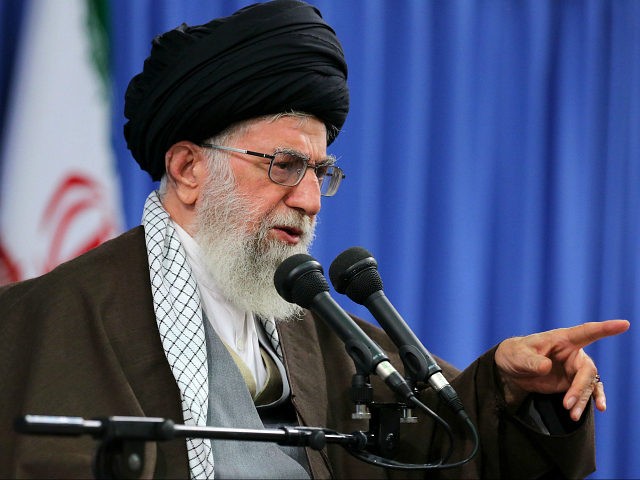Kurdish officials are hitting back against Iranian Supreme Leader Ayatollah Ali Khamenei, who has expressed “strong opposition” to a September referendum on establishing an independent Kurdistan in what is now Iraq.
The Kurdistan Regional Government (KRG) recently announced it would hold a referendum vote on September 25 on whether the KRG should declare independence from Baghdad, which is currently controlled by a Shiite, Iran-friendly government.
The KRG is largely pro-American, its Peshmerga have played a prominent role in the fight against the Islamic State, and its government would remain based in northern Erbil.
“This referendum is taking place outside Iran, and therefore, it is necessary for the officials of Iran and the Supreme Leader of the Islamic Republic to not interfere in the [internal] affairs of other countries, mind their business, and take care of their own country,” Kurdistan Democratic Party (KDP) leadership member Ali Awni said in an interview Wednesday, according to the Kurdish outlet Rudaw.
Awni continued, “I believe that the issue of holding referendum in Kurdistan Region first and foremost concerns the Kurdish nation, especially in this part of Kurdistan.” He added that any meddling by Khamenei in the Kurdistan referendum would allow Erbil “to talk about the fate of the eastern Kurdistan, meaning Iran.”
The territory of Kurdistan–the home of the Kurdish ethnic group–consists of land throughout Syria, Iraq, Iran, and Turkey. While the Turkish government has recently been loudest in opposing any Kurdish separatist movements within its border, Iran keeps a close eye on its Kurdish population and acts to limit any political organization that could threaten the regime.
Supreme Leader Khamenei spoke out against the referendum this week following a meeting with Iraqi Prime Minister Haider al-Abadi. Abadi is currently touring the Middle East and arrived in Iran after meeting government leaders in Saudi Arabia. In a statement on his official website, Khamenei dismissed the KRG referendum as an American plot “to wreak havoc in Iraq.”
“One should be vigilant against the US and never trust them because they and their allies in the region oppose Iraq’s independence, identity and unity,” Khamenei said. “No chance should be given to the US to sow discord or conflict in Iraq. The US forces should be prevented from intervening in Iraq on the pretext of education or other issues.”
“The Islamic Republic of Iran—as Iraq’s neighbor—opposes implications that a referendum should be held to partition Iraq,” Khamenei concluded.
Khamenei’s statement did not address the fact that the U.S. State Department does not support the referendum. While acknowledging “the legitimate aspirations of the people of the Iraqi Kurdistan,” State Department spokeswoman Heather Nauert said that the Trump administration categorically supported “a unified, stable and a federal Iraq.”
While the United States issued a cautious statement following the announcement, military officials in the country have described Kurdish independence as a matter of “not if, but when.”
In February, Kurdish officials told Rudaw that the Iranian government appeared to be taking a “wait and see” approach to whether the KRG would declare independence. Tehran supported the creation of the KRG in 2005 as a subsidiary federal unit of the Iraqi government and was the first government to open a consulate in Erbil.
“I can say that the Islamic Republic has so far not rejected the status quo in the Kurdistan Region,” Kurdish official Nazim Dabagh said at the time. “But they stress the unity of Iraq and rely on relations between the KRG and Baghdad.”
Dabagh also claimed, however, that Iran had responded to the referendum announcement with less vitriol than Turkey, which has condemned the move as triggering instability in the middle of a war with the Islamic State. While Iran may rhetorically be less aggressive against the move than Turkey, the supreme leader’s condemnation is clear.
As the government of Baghdad is run by Shiites, Iranian officials have boasted that Tehran has full control over that capital, along with three others: Damascus, Syria; Beirut, Lebanon; and Sana’a, Yemen.

COMMENTS
Please let us know if you're having issues with commenting.